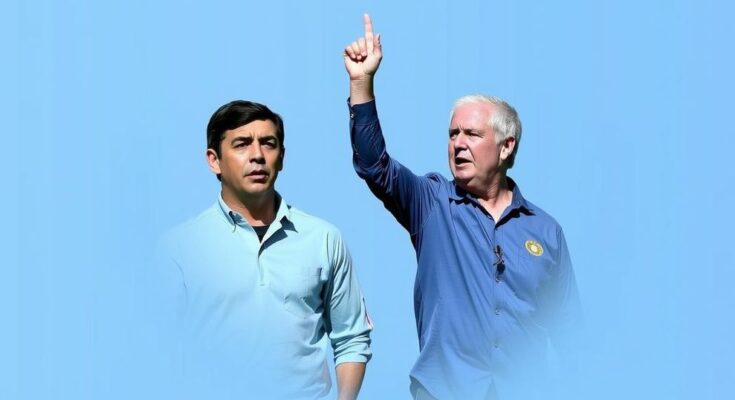Uruguay’s presidential runoff features a close contest between Yamandú Orsi of the Broad Front and Álvaro Delgado of the National Party following a split first-round vote. Support for both candidates is nearly equal with 10% of voters undecided, reflecting a lack of enthusiasm among the electorate. The election hinges on key issues such as crime rates, economic policy, and governance styles from the recent administration.
Uruguay’s presidential runoff election is witnessing an unexpected contest between two candidates, with a noteworthy scenario developing following the initial voting results. Frontrunner Yamandú Orsi, representing the Broad Front coalition, garnered 44% of the votes in the first round, while his opponent, Álvaro Delgado of the National Party, acquired only 27%. Nevertheless, the additional conservative parties, mainly the Colorado Party, collectively obtained 20%, allowing Delgado to maintain a competitive edge in the runoff set for Sunday, November 25, 2024.
The political atmosphere is characterized by a tight race, with both candidates finding themselves in a dead heat, as indicated by numerous polls reflecting nearly equal support levels, despite around 10% of voters remaining undecided. Observers have noted that the muted campaigns and widespread consensus on core issues have led to significant voter uncertainty and a lack of enthusiasm, contrasting with the populist fervor seen in other parts of the world.
In addressing public concerns, particularly regarding rising crime rates, both candidates are attempting to connect with voters. Delgado, a seasoned National Party member and veterinarian, has pledged to continue the policies of President Luis Lacalle Pou, promoting a stable economic legacy, despite some past corruption allegations against the administration. Meanwhile, Orsi seeks to establish a so-called “new left,” focusing on investment incentives, industrial policies for agriculture, and modest pension reforms.
This election cycle has highlighted Uruguay’s unique political landscape, distinguishing it from many global electoral scenarios characterized by polarization. Overall, it is a pivotal moment for Uruguay as voters prepare to weigh their options between a continuation of the current government’s policies and pursuing change through Orsi’s innovative approaches.
Uruguay’s political dynamics have shifted significantly since the center-left Broad Front coalition previously governed the nation for 15 years until the 2019 election brought in the center-right National Party, led by President Luis Lacalle Pou. The country’s political climate now features a dichotomy between conservative and left-leaning factions, especially in light of pressing socio-economic issues. The Lombard nature of the current election reflects both the supporters’ and critics’ sentiments regarding reform, governance, and national direction as the election approaches.
The upcoming presidential runoff in Uruguay represents a crucial moment for the nation, determining whether voters will opt for continuity under Álvaro Delgado or a shift towards the strategies proposed by Yamandú Orsi. As both candidates vie for undecided voters, the outcome will not only influence domestic policies but also signify the public’s collective response to governance challenges in a changing global landscape. Consequently, the elections will test Uruguay’s democratic resilience amid broader democratic challenges worldwide.
Original Source: apnews.com




